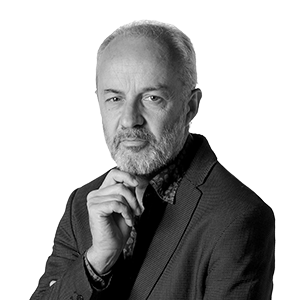

There are people who create problems and there are people who solve them. Individual happiness and social coexistence are built day by day, gesture by gesture. Problems are there, of course. Life is entropy; we tend toward chaos. Solvers are usually discreet, hardworking, and kind. Those who revel in problems—problem-mongers?—can be very conspicuous and noisy, and appear to be vigilantes. "Immigrants out! Politicians out! Catalans are dying!" And they start shouting.
Often, however, scratch a little, and behind the bad mood, there is no idea or plausible action. Before that, we call it reventismo. It's fine to rebel against what we don't like, but bitter complaints, the search for easy culprits, and proclamations as showy and simplistic as they are false aren't enough. The triumph of ultra-populism, in all its grotesque forms, both those from abroad and those from within, comes from here. They are united by their loud voices and the pointing of enemies in every tweet. They conduct politics as if they were waging war. They are proudly immoderate and boastful, with lewd smiles. I don't need to name names, do I?
On the other side, we have a peaceful army of silent heroes who are working hard without raising a flag, both in politics—yes, despite the bad press, there are still many people dedicated to grassroots politics or who work in the administration with a desire to serve, to work—and in civil society. In this second area, in Catalonia we have a vast and diverse range of social organizations, the so-called third sector. A treasure that is too undervalued. Associations that, if they were in the United States, would right now be in the eye of the Trumpist storm, threatened with disappearance. What does it mean to help immigrants, the homeless, the disabled, the unemployed, battered women, countries burdened by poverty...? Let them figure it out on their own! Don't take advantage of public services and aid! Too many subsidies!
This is the discourse that is spreading like wildfire without much subtlety. Compassion? Help? Solidarity? The old concepts of Christian humanism are being interrupted, ridiculed. And yet, someone is doing the thankless work of maintaining a minimum of social cohesion on the ground, against all odds. It's not the solidarity-spectacle of the Gaza Flotilla, which I'm not saying isn't useful and necessary to raise awareness, but it's equally or more important. Without their daily support for so many people in distress, we would collectively be much worse off. It's this small army of committed volunteers and equally committed—and low-paid—workers from social organizations who roll up their sleeves to bridge the bureaucratic coldness of the administration, filling the gaps in care left by the system, finding concrete solutions to complex situations, speaking face-to-face with people who can't. Human expertise and practicality. They solve.
They are, in short, an invisible and fragile state structure. They perform core work under complicated conditions, with volatile financial support from the administration, without sufficient legal recognition, always dependent on changing government whims. They are non-profit, but they are often treated as just another private commercial agent. Our stagnant welfare state would be unviable without the participation of third-sector entities. Why, then, don't we give them the institutional recognition they deserve? In Europe, there are many entities that, for example, build and manage public housing, and with greater solvency than the administration: the housing associations The Netherlands has 2.3 million homes in particular. And in Switzerland, housing cooperatives are key in cities like Zurich and Basel. When it comes to coordinating services, the priority should be social entities, whether in healthcare, education, or housing, a basic necessity that cannot be left solely to the free market. Let's take care of our silent heroes.
